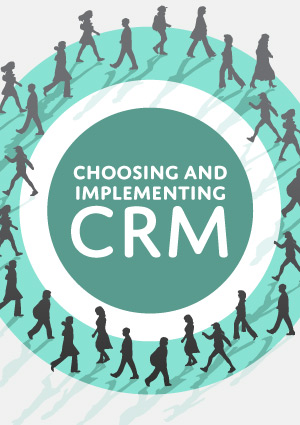
Choosing and Implementing CRM
A CRM solutionSolution Solution is a combination of ideas, strategies, processes, technologies and services that effectively helps an organization achieve its goals or hurdle its challenges. is the backbone of a company’s sales efforts. For that reason choosing a CRM solution should be done with the greatest of care and attention—this isn’t a task that you should take lightly or skimp on. The next step is CRM implementation—which also must be undertaken with care. In fact, it will be found that skimped implementation, especially with users, is a primary reason for costly CRM failure.
In this ebook we guide you through the steps necessary to choose and implement a CRM solution wisely.
Chapter 1: Before Choosing a CRM Solution, Define Your Terms
“If you would argue with me, first define your terms!” This famous demand was first made by French philosopher Voltaire way back in the seventeenth century, yet it finds complete applicability today—especially when it comes to the specification and selection of automation tools such as CRM solutions.
Chapter 2: 5 Qualities of Your Own Self-Designed CRM Solution
Completely putting aside the real world for the moment, what if you could build your own ideal CRM solution for your company, from the ground up, that functioned exactly the way the company needed it to?
Chapter 3: CRM Solution Implementation: Doing It Right
All too often a company purchases a CRM solution, implements it, and gets everyone using it—without having taken some very necessary steps beforehand.
Chapter 4: Finding the Perfect Marriage of Sales Force Skill and Automation
With the sales force, the skill of selling must be perfectly supported with computerized automation in the form of a CRM solution. But as with a car and driver, both the salesperson and CRM solution must be brought to certain levels before they work well as a unified whole.
Chapter 5: CRM Solutions: Issues for Sales Management
Sales reps often complain that traditional, cumbersome CRM solutions benefit sales management, not the sales force. What the reps can’t see—simply because they are not there—is that sales management is suffering because of these CRM applications also.
Chapter 6: Sales ForecastingForecasting Forecasting is a prediction or calculation of a trend or event likely to occur in the future based on qualitative, quantitative and historical data as well as emergent but relevant factors. Begins with Sales Force OrganizationOrganization Organization is a cohesive group of people working together and formally bound by a shared identity (e.g., one team, company, club, etc.) and a common purpose (e.g., business growth, athletic victory, etc.).
We’ve all been there. A sales forecast is done and a corresponding sales quotaQuota Quota is a predefined benchmark indicating the amount of sales a selling unit such as a sales rep or a regional sales team should achieve within a given period, often used as a measure of success, performance and eligibility for commissions and other rewards. set for a quarterQuarter Quarter is a three-month period in a company’s fiscal year commonly used to make comparative performance analyses, detect or forecast business trends, report earnings, and pay shareholder dividends. or a year. About four-fifths of the way through that sales period everyone realizes that without a few miracles the quota will not be met. Taking a very broad look, this is actually a problem of accurate sales forecasting.
Learn More About Pipeliner CRM
Take a no-obligation 14 day trial of Pipeliner CRM.
No credit card info required – just experience for yourself how it could impact your sales.
Additional Resources
This ebook is on the subject of “Win Together.” It falls under the same context as“win-to-win” described in my book Network Selling: Guarantee Success for the Digital Age. Today, this aspect of sales is more important than ever, and must also be part and parcel of CRM solutions.
“For some years I’ve been saying that, as a society, we’re in the midst of a transformation. Given what’s happened in the last couple of years, there’s no one left who is disagreeing with me! It’s become very obvious.”
 Nikolaus Kimla, CEO at Pipelinersales, Inc.
Nikolaus Kimla, CEO at Pipelinersales, Inc.A common term in sales today is EQ, which stands for “emotional I.Q.” It means the skill a salesperson has in reading emotions and utilizing them in sales. It means empathy and a number of other abilities. The short version is, it’s an I.Q. when it comes to emotions. But just as with our Network Selling model, E.Q. isn’t just for sales, either. It’s actually the missing factor in human interactions, for confrontation—a common “tool” in human interactions—doesn’t actually handle anything.
“You can have everything in life you want if you will just help enough other people get what they want.”
 Zig Ziglar
Zig Ziglar








